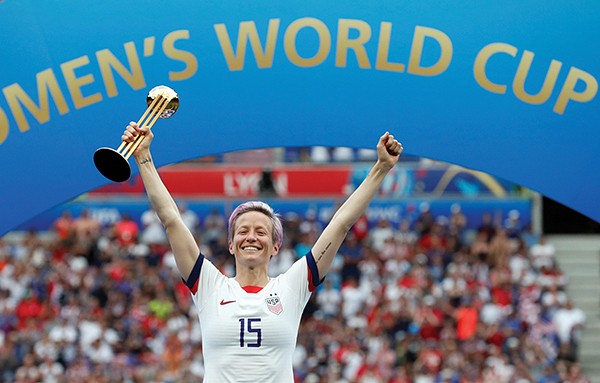Women deserve pay equal to their male counterparts in every circumstance and on all stages. There is no reasoning, no logic, and no basis to support why women, doing the same job as men — and in some cases doing it better — should be paid less because of their gender. Over the past few weeks, the U.S. women’s national soccer team dominated the World Cup championship in France, taking home the trophy for the second straight time. The team’s 2-0 victory over the Netherlands on Monday was their fourth World Cup title and further secured the players’ spot in the pantheon of the world’s great athletes.
While winning the title — and being fierce examples for other women athletes — members of the team were also involved in a lawsuit, filed in March, against the U.S. Soccer Federation (USSF) for equal pay.
 Reuters | Bernadett Szabo
Reuters | Bernadett Szabo
Megan Rapinoe
Twenty-eight members of the team sued the U.S. Soccer Federation for alleged gender discrimination. The players argued, rightfully, that the women’s team is paid substantially less than the men’s team, despite the women’s team consistently outperforming the men. The women are also fighting for equal playing, training, and travel conditions, as well as equitable promotion of their games.
The lawsuit also points out that although over the past three years the women’s team has generated more revenue and higher TV ratings than the men’s team, which didn’t even qualify for the 2018 World Cup, they are paid less simply because they are women. From 2016 to 2018, women’s team revenue was $50.8 million, compared to the $49.9 million for the men.
And the women are not earning the bonuses that the men are for similar accomplishments. According to an analysis by The Guardian, the women’s team earned a total of $200,000 in bonuses for their performance at the World Cup. In contrast, the men’s team would earn $1.1 million for the same outcome — a $900,000 difference.
Nike reported that the women’s 2019 stadium home jersey has outpaced sales of all other U.S. soccer jerseys during one season, men’s or women’s.
The players are not alone in their pursuit for equality. After their victory on Sunday, the cheers of the crowd in Lyon, France, quickly turned into a chant urging for equal pay. In addition, after the women players filed the lawsuit, the men’s national team issued a statement in support of the women’s efforts. “We wait on U.S. Soccer to respond to both players associations with a way to move forward with fair and equal compensation for all U.S. soccer players,” the men wrote.
Even some in Congress, including Tennessee 9th District Representative Steve Cohen, entered the conversation, writing a supportive letter to the USSF president. It was signed by more than 50 legislators and asked the federation to justify the differences in compensation, pointing out that the current pay disparity sends a message to women that “their skills and accomplishments are of lesser value.”
In a post-game interview, Megan Rapinoe, the team’s badass captain, reiterated to reporters that it was time to have a conversation about equal pay. “We can’t do anything more to impress more, to be better ambassadors, to take on more, to play better, to do anything.”
She’s right. These women have more than proven they deserve fair compensation. What else will it take to make the world believe that all women athletes deserve equal pay for their hard work, achievements, and expertise?
And it’s not just with athletes. The gender pay gap also permeates the workplace. According to payscale.com, women on average make 79 cents for every dollar men make, when comparing the median salaries for all men and women. When looking at men and women performing the same job, women make two percent less than men. According to payscale.com, in health care, women are making 89 cents to every dollar men make. In the legal field, women are only making 62 cents for every dollar. And in architecture and engineering, women make 93 cents for every dollar men make.
It’s time for a change — on the field and off.
Maya Smith is a Flyer staff writer.